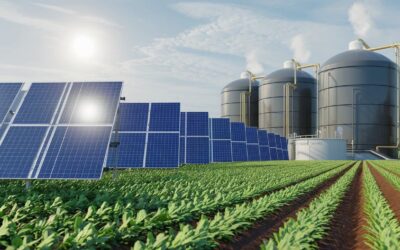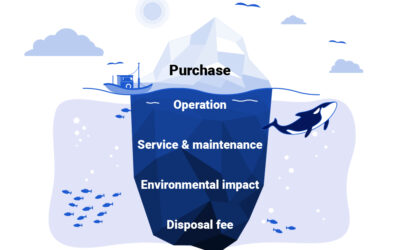Biogas is a renewable energy source that is gaining increasing attention as a sustainable solution for energy independence.
But what exactly is biogas and how is it produced? Biogas is a natural gas composed mainly of methane (CH4) and carbon dioxide (CO2), which is produced by the anaerobic decomposition of organic materials such as food waste, animal manure and agricultural waste.
This process occurs in an oxygen-free environment, known as an anaerobic digester.
During decomposition, anaerobic bacteria break down organic matter, producing biogas as a byproduct.

The advantages of biogas as a sustainable energy source
Biogas offers numerous advantages as a sustainable energy source.
First, biogas is a clean fuel, as its combustion produces much lower greenhouse gas emissions than traditional fossil fuels.
This helps reduce environmental impact and tackle the problem of climate change.
Furthermore, biogas can be produced using waste organic materials, thus reducing the waste problem and providing a way to recycle and reuse such materials.
At the same time, the biogas production process can generate a by-product called digestate, which can be used as a natural fertilizer for agriculture, thus helping to reduce the use of chemical fertilizers.
The biogas production process and associated technology
The biogas production process requires a series of specific phases and technologies.
First, the organic waste materials are collected and placed in an anaerobic digester.
Inside the digester, anaerobic bacteria decompose organic matter and produce biogas.
This biogas is then collected and purified to remove any impurities such as sulfur dioxide and moisture.
Finally, the purified biogas can be used as a fuel for the generation of electrical or thermal energy, or it can be transformed into biomethane for use as a vehicle fuel.

The technology associated with biogas production is constantly evolving, with new solutions and innovations making the process more efficient and cost-effective.
Applications of biogas in different industrial sectors
Biogas finds numerous applications in various industrial sectors.
In the agricultural sector, for example, biogas can be used to power engines and generators for the production of electrical and thermal energy, thus reducing energy costs and providing a sustainable alternative to traditional energy.
In the context of waste management, biogas can be used to produce electricity or thermal energy from organic waste, thus helping to reduce the amount of waste sent to landfill.
Furthermore, biogas can be used as a fuel for vehicles, thus reducing the environmental impact of the transport sector.
These are just some of the many applications of biogas, which demonstrate its potential in various industrial sectors.
Biogas as a solution for energy independence
Biogas can play a key role in achieving energy independence.
By using biogas as an energy source, it is possible to reduce dependence on fossil fuels and external energy supplies.
Furthermore, biogas can be produced locally using organic waste materials available in the area, thus reducing transportation and supply costs.
This makes biogas an ideal solution for rural communities and farms looking to achieve energy independence and reduce energy costs.
Furthermore, biogas can be used in combination with other renewable energy sources, such as solar energy and wind energy, to create an integrated and sustainable energy system.
Government incentives and policies to support biogas production
To promote biogas production and the use of renewable energy sources, many governments offer incentives and support policies.
These can include guaranteed feed-in tariffs, subsidies for the installation of biogas plants and tax breaks for investments in the renewable energy sector.

Furthermore, some policies may require companies or institutions to use a certain percentage of energy from renewable sources, thus encouraging the adoption of biogas and other sustainable energy sources.
These incentives and policies can be key to encouraging the development of the biogas sector and creating an environment conducive to the production and use of sustainable energy.
Challenges and limitations of biogas production
Despite its many advantages, biogas production also presents some challenges and limitations.
One of the main challenges is the availability of high-quality organic waste materials.
The quantity and quality of available organic materials can vary depending on location and industry, which can impact the economic feasibility of biogas production.
Furthermore, the biogas production process requires careful control of digestion conditions and can be influenced by factors such as temperature and pH.
This requires competent management and adequate technology to ensure the efficiency and stability of the process.
Finally, the implementation of biogas plants can involve high initial costs, which can represent a barrier for small and medium-sized businesses or local communities.
Case studies of successful biogas projects
To demonstrate the potential of biogas and illustrate the practical benefits, it is useful to look at some case studies of successful biogas projects.
An example is the agricultural biogas project on a dairy farm, where animal manure is used to produce biogas that powers a generator for electricity production.
This allowed the farm to reduce energy costs and generate additional income from the sale of the energy produced.
Another example is the urban biogas project, where food waste is collected and transformed into biogas for the production of thermal energy.
This has allowed the city to reduce the amount of waste sent to landfill and generate clean energy for heating public buildings.
These are just two examples that demonstrate how biogas can be used effectively and advantageously in different contexts.
Conclusions: The future of biogas and its role in achieving energy sustainability
Biogas offers a unique opportunity to harness the power of renewable energy sources and promote energy sustainability.
With its many advantages as a clean and sustainable energy source, biogas can play an important role in achieving energy independence and combating climate change.
However, to fully realize the potential of biogas, the challenges and limitations associated with its production and use must be addressed.
This requires a commitment from governments, businesses and society to promote biogas and create an enabling environment for its adoption.
With the right support and continued technological innovation, biogas can become an increasingly important source of energy and help create a sustainable energy future.
Do you need a biogas plant?
Contact us today to learn more about our solutions and discover how biogas can help you achieve energy independence.




